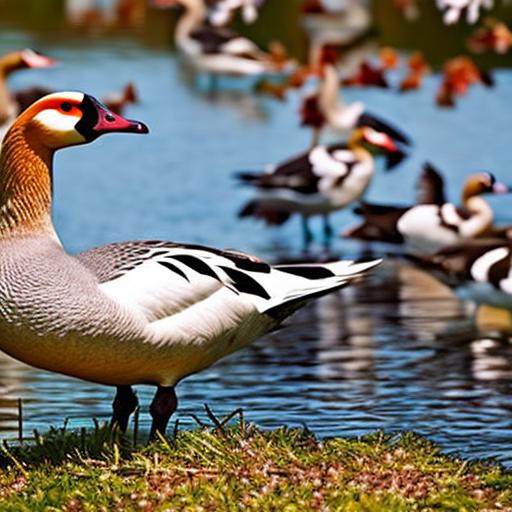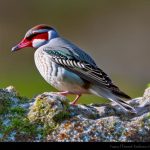Geese infestations can be a frustrating problem for homeowners. These large birds can cause damage to lawns, gardens, and property, and their droppings can create unsightly messes. Finding humane solutions to keep geese out of your yard is important not only for the well-being of your property, but also for the well-being of the geese themselves. In this article, we will explore various methods and strategies for deterring geese from your yard in a humane and effective way.
Key Takeaways
- Geese are social animals that prefer to stay in groups and are attracted to open spaces with water and food sources.
- Common geese deterrents include visual and auditory scare tactics, such as predator decoys and loud noises.
- Physical barriers, such as fences and netting, can be effective in keeping geese out of certain areas.
- Decoys, such as fake predators or other animals, can also be used to deter geese from your yard.
- Creating an uninviting environment for geese by eliminating food sources and maintaining a clean yard can help prevent infestations.
Understanding the behavior of geese
In order to effectively deter geese from your yard, it is important to understand their habits and patterns. Geese are social animals that typically travel in flocks and are known for their strong family bonds. They are attracted to areas that provide them with food, water, and shelter. Geese are also creatures of habit and tend to return to the same locations year after year.
There are several reasons why geese are attracted to certain areas. One reason is the availability of food sources. Geese are herbivores and feed on grass, grains, and other vegetation. They are particularly drawn to areas with lush green lawns or open fields where they can easily find food. Another reason is the presence of water. Geese need water for drinking, bathing, and nesting. They are often found near bodies of water such as ponds, lakes, or rivers.
Identifying common geese deterrents
There are several deterrents that can be used to keep geese out of your yard. These deterrents can be categorized into natural, chemical, and electronic options.
Natural deterrents involve using natural substances or objects that repel geese. One example is planting certain types of vegetation that geese find unappealing. Tall grasses or plants with prickly leaves can discourage geese from landing in your yard. Another natural deterrent is the use of predator decoys, such as fake owls or coyotes. These decoys create the illusion of a predator presence and can scare geese away.
Chemical deterrents involve the use of substances that geese find unpleasant or irritating. One common chemical deterrent is methyl anthranilate, which is a grape extract that is harmless to humans and other animals but has a strong odor that repels geese. This substance can be sprayed on grass or other areas where geese are likely to land.
Electronic deterrents use technology to deter geese. One example is the use of motion-activated sprinklers that spray water when geese approach. The sudden burst of water can startle and deter the geese from landing in your yard. Another electronic deterrent is the use of sound devices that emit loud noises or distress calls that mimic the sounds of predators. These devices can be effective in scaring geese away.
Installing physical barriers to keep geese out
Physical barriers can be an effective way to keep geese out of your yard. There are several options for physical barriers, including fencing, netting, and spikes.
Fencing can be used to create a physical barrier that prevents geese from entering your yard. A fence should be at least three feet high and have small openings or mesh to prevent geese from squeezing through. It is also important to bury the bottom of the fence at least six inches deep to prevent geese from digging under it.
Netting can be used to cover areas where geese are likely to land, such as ponds or lawns. The netting should be stretched tightly and secured to prevent geese from getting tangled in it. It is important to regularly inspect and maintain the netting to ensure its effectiveness.
Spikes can be installed on ledges, roofs, or other surfaces where geese are likely to perch or roost. The spikes create an uncomfortable surface that discourages geese from landing. It is important to choose spikes that are humane and do not cause harm to the geese.
Using decoys to deter geese from your yard
Decoys can be an effective way to deter geese from your yard. There are several types of decoys that can be used, including predator decoys, motion decoys, and floating decoys.
Predator decoys, such as fake owls or coyotes, create the illusion of a predator presence and can scare geese away. These decoys should be placed in areas where geese are likely to land or roost.
Motion decoys are decoys that move or have moving parts. These decoys create the illusion of movement and can make geese think that there is a threat present. Motion decoys can be placed in areas where geese are likely to land or near food sources.
Floating decoys are decoys that float on water. These decoys can be used to create the illusion of a flock of geese and can deter other geese from landing in your yard. Floating decoys should be placed in areas where geese are likely to land or near bodies of water.
Creating an uninviting environment for geese

Creating an uninviting environment for geese can help deter them from your yard. There are several landscaping tips that can make your yard less attractive to geese.
One tip is to avoid planting grass or vegetation that geese find appealing. Geese are attracted to lush green lawns and open fields where they can easily find food. By planting less attractive grasses or vegetation, you can discourage geese from landing in your yard.
Another tip is to create barriers or obstacles that make it difficult for geese to access your yard. This can include planting shrubs or bushes along the perimeter of your property or installing rocks or other obstacles near bodies of water.
Water management is also important in creating an uninviting environment for geese. Geese are attracted to areas with water for drinking, bathing, and nesting. By managing the water sources in your yard, such as draining or covering ponds or pools, you can discourage geese from staying in your yard.
Eliminating food sources that attract geese
Eliminating food sources that attract geese is an important step in deterring them from your yard. There are several ways to eliminate food sources that attract geese.
Proper garbage disposal is important in preventing geese from accessing food sources. Make sure to secure garbage cans with tight-fitting lids and avoid leaving garbage bags or food scraps outside.
Removing fallen fruit from trees or bushes can also help eliminate food sources for geese. Geese are attracted to fruit trees and bushes and will often feed on fallen fruit. Regularly inspect your yard and remove any fallen fruit to discourage geese from feeding.
Avoiding feeding geese is another important step in eliminating food sources. Feeding geese can create a dependency on human-provided food and can encourage them to stay in your yard. It is best to avoid feeding geese altogether.
Using sound and light to scare geese away
Sound and light can be effective deterrents for geese. There are several options for using sound and light to scare geese away.
Noise makers, such as air horns or whistles, can be used to create loud noises that startle and deter geese. These noise makers should be used sparingly and strategically to avoid habituation.
Motion-activated lights can also be effective in scaring geese away. These lights turn on when they detect motion and can startle geese. It is important to place the lights in areas where geese are likely to land or roost.
Implementing humane methods to keep geese out
It is important to prioritize humane methods when deterring geese from your yard. Humane methods ensure the well-being of both the geese and your property.
Humane methods involve using deterrents or strategies that do not cause harm or distress to the geese. This can include using natural deterrents, such as planting unappealing vegetation or using predator decoys. It can also involve using electronic deterrents, such as motion-activated sprinklers or sound devices.
Examples of humane methods include creating an uninviting environment for geese, eliminating food sources, and using sound and light to scare them away. These methods prioritize the well-being of the geese while still effectively deterring them from your yard.
Seeking professional help to deal with geese infestations
In some cases, it may be necessary to seek professional help to deal with geese infestations. Professional services can provide expertise and specialized equipment to effectively deter geese from your yard.
It is important to know when to seek professional help. If you have tried various deterrents and strategies without success, or if the geese infestation is causing significant damage or posing a health risk, it may be time to seek professional assistance.
When choosing a professional service, it is important to do your research and find a reputable company with experience in dealing with geese infestations. Look for companies that use humane methods and have a track record of success in deterring geese.
Maintaining a geese-free yard with regular upkeep and monitoring
Once you have successfully deterred geese from your yard, it is important to maintain a regular upkeep and monitoring routine to ensure that they do not return.
Regular upkeep involves maintaining physical barriers, such as fences or netting, and ensuring that they are in good condition. It also involves regularly inspecting your yard for any signs of geese or damage caused by them.
Monitoring your yard involves keeping an eye out for any signs of geese or their presence. This can include watching for geese flying overhead, landing in nearby areas, or leaving droppings in your yard. By monitoring your yard regularly, you can quickly identify any potential issues and take action to deter geese before they become a problem.
In conclusion, finding humane solutions to keep geese out of your yard is important for both the well-being of your property and the well-being of the geese themselves. Understanding the behavior of geese, identifying common deterrents, installing physical barriers, using decoys, creating an uninviting environment, eliminating food sources, using sound and light, implementing humane methods, seeking professional help, and maintaining regular upkeep and monitoring are all strategies that can be used to effectively deter geese from your yard. By taking action and implementing these strategies, you can enjoy a geese-free yard while ensuring the well-being of these beautiful birds.
If you’re looking for effective ways to keep geese out of your yard, you may also be interested in learning about the benefits of having an A-frame chicken coop. Not only does it provide a safe and secure space for your chickens, but it can also serve as a deterrent for unwanted visitors like geese. To find out more about A-frame chicken coops and how they can help protect your yard, check out this informative article on Poultry Wizard: https://poultrywizard.com/keeping-chickens/a-frame-chicken-coop/.
FAQs
What are some common reasons for wanting to keep geese out of your yard?
Geese can cause damage to lawns, gardens, and crops. They can also be aggressive towards humans and pets, and their droppings can create unsanitary conditions.
What are some effective ways to keep geese out of your yard?
Some effective methods include installing physical barriers such as fences or netting, using decoys or scare tactics, and removing food sources. It is important to note that geese are protected under federal law, so it is illegal to harm or kill them without a permit.
Are there any natural deterrents that can be used to keep geese away?
Yes, some natural deterrents include planting certain types of vegetation that geese do not like, such as tall grasses or prickly bushes. Additionally, some people have had success using essential oils or vinegar sprays to repel geese.
What should I do if I encounter an aggressive goose?
It is important to give geese plenty of space and avoid approaching them. If a goose becomes aggressive, try to back away slowly and avoid making direct eye contact. If necessary, seek help from a professional wildlife control service.
Is it legal to harm or kill geese?
No, geese are protected under federal law and it is illegal to harm or kill them without a permit. It is important to find humane and legal methods for keeping geese out of your yard.
Meet Walter, the feathered-friend fanatic of Florida! Nestled in the sunshine state, Walter struts through life with his feathered companions, clucking his way to happiness. With a coop that’s fancier than a five-star hotel, he’s the Don Juan of the chicken world. When he’s not teaching his hens to do the cha-cha, you’ll find him in a heated debate with his prized rooster, Sir Clucks-a-Lot. Walter’s poultry passion is no yolk; he’s the sunny-side-up guy you never knew you needed in your flock of friends!







